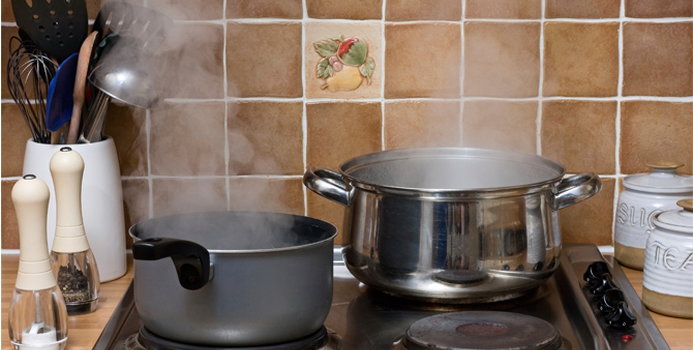There are very few ingredients in your pantry that will serve the myriad of functions that salt fulfills. Typically, we use salt to enhance the flavors of our food. One such case is the addition of salt to boiling water for the preparation of things such as pasta or potatoes.
Sodium is an essential mineral, found widely in U.S. diets. Within the body, it is found within every cell and is used to transmit nerve impulses. Additionally, the balance between sodium and other ions regulates the pressure of cells and is related to your blood pressure. However, while it is an essential nutrient, if you're like most Americans, you are probably getting more sodium than your body needs, or that is good for your health.
Daily Allowance of Sodium
The U.S. Food and Drug Administration (FDA) recommends that individuals consume no more than 2,300mg of sodium per day, and that certain groups, such as those with a sensitivity to salt, limit intake to 1,500mg per day. Currently, the average U.S. adult consumes about 3,400mg of sodium each day.
In some people, sodium will increase blood pressure. It does so by attracting and holding excess fluid in the body, creating a greater burden on your heart. Blood pressure also rises with age. Eating less sodium now can help to combat that rise and reduce your risk of developing other conditions associated with too much sodium, such as stroke, osteoporosis, stomach cancer, heart failure and kidney disease.
Truth About Adding Salt to Boiling Water
There is an old wives' tale that says salted water will make pasta cook faster. While it's not entirely false, adding salt does not make much of a difference to actually matter. One ounce of salt raises the boiling point of water by only 1 degree Fahrenheit. To raise the boiling point enough to make any significant difference in cooking time, you would have to add so much salt that your pasta, or other food items, would be inedible.
So really, it all boils down to taste. Salt also tends to be utilized in boiling water to try and impart greater flavor to whatever it is you are cooking. Experimental trials were conducted to observe the difference in sodium between plain cooked pasta, and pasta cooked in salted water. In one group, one pound of spaghetti was cooked using 4 quarts of boiling water, to which one-quarter cup of salt was added. Only about 3% of the sodium was absorbed into each serving of pasta. However, 3% of the sodium in one-quarter cup is around 896mg, nearly 40% of your 2,300mg daily limit. So, while you may not be using such large amounts in your cooking water at home, the take away is that the salt is absorbed into the food to a certain degree, therefore adding to your total daily sodium intake.
While adding salt to boiling water does contribute some sodium to your diet, more care should be taken to reduce other, greater sources of sodium. While the salt shaker may seem like an easy scapegoat, it is not actually the biggest contributor to our sodium consumption. Approximately 75% of the sodium that we eat comes from processed foods and restaurant foods. However, reducing the salt you add to boiling water, or even eliminating it completely, is one simple change that will help to reduce your overall intake. Instead, try saving the salt for the sauce, or other meal components that naturally pack the sodium. If your salt intake is something that you need to watch, or if you are like most Americans and are already overconsuming, nixing extra salt from your pasta is one easy change to help get you in the recommended ranges.
Sarah Dreifke is a freelance writer based in DeKalb, IL with a passion for nutrition education and the prevention of chronic disease. She holds a Bachelor of Science in both Dietetics and Life Sciences Communication from the University of Wisconsin-Madison. Currently, she is working towards a combined Master's Degree in Nutrition and Dietetics as well as a dietetic internship at Northern Illinois University.




